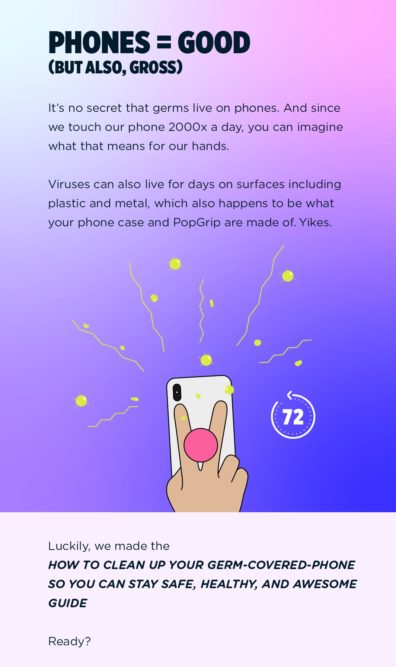Covid-19: Zebra, UPS issue guidelines for cleaning handheld computers between warehouse shifts
“Clean your damn phone!” consumer electronics retailer Popsockets reminds users.

Handheld computers, smartphones, and RFID guns have grown to be crucial warehouse and logistics tools in recent years, but several technology vendors are now reminding users of the need to wipe down those electronic units between shifts to avoid the potential spread of coronavirus.
For weeks, public health professionals have been reminding people to avoid Covid-19 infection by washing their hands and avoiding touching their faces, but much less is known about how the virus can spread on surfaces like tables and doorknobs. That is now raising concerns about the best way to block coronavirus, when an average consumer touches their smartphone 2,000 times a day, according to the protective phone case maker Popsockets LLC.
That same concern extends to the thousands of electronic devices that most logistics professionals use as part of their daily routine, including mobile computers, barcode scanners, printers, and even the handheld “DIAD” computers used by thousands of UPS Inc. package delivery drivers to manage routing and delivery on their daily rounds. As part of its bundle of enhanced cleaning and hygiene policies needed to continue operations during the epidemic, Atlanta-based UPS is now providing sanitizing supplies to its drivers to keep both their DIADs and their vehicles clean, the company said.
Businesses is all sectors of the supply chain should perform thorough disinfections of their fleets of mobile computers, tablets, printers, scanners, and other devices as a critical step toward infection control in workplaces and public spaces, according to Lincolnshire, Illinois-based Zebra Technologies Corp.
“Given the rapidly evolving situation with the Covid-19 coronavirus, we are receiving a high volume of questions about how our products should be cleaned in order to best protect the front-line workers using them in hospitals, warehouses, stores, routes, and more,” Zebra said in a recent blog post. “Cleaning devices that are going to be used by multiple workers across shifts is a key requirement that we consider not only when designing our products, but also in providing our customers and partners clear guidance on how they can most effectively clean and disinfect them once they are installed in the field.”
Despite the need for improved hygiene, there is no one-size-fits-all approach for deploying a cleaning protocol for those expensive devices, Zebra advised. Rather, users should look up the user guide for their exact model on the “support” section of the Zebra website, and turn to the “cleaning instructions” section, the company said. According to Zebra, employers should enact a device cleaning policy as soon as possible, using original equipment manufacturer (OEM) guidelines, helping to ensure that employees are properly disinfecting mobile devices, scanners, printers, and more on a routine basis.
The Boulder, Colorado-based consumer product retailer Popsockets phrased its similar warning a little more bluntly. “Clean your damn phone!” was the subject line in an email to customers sent this week by the company, which makes the coin-sized adhesive disks that many people affix to the back of their phones as helpful handles. “It’s no secret that germs live on phones. And since we touch our phones 2,000x a day, you can imagine what that means for our hands,” Popsockets said in the email. “Viruses can also live for days on surfaces including plastic and metal, which also happens to be what your phone case and PopGrip are made of. Yikes.”
As a solution, Popsockets offered its customers a set of phone-cleaning instructions called the “How to clean up your germ-covered-phone so you can stay safe, healthy, and awesome guide.” The infographic-styled manual advises users to remove their phone case and scrub all surfaces with soap or antiseptic wipes.
To see further coverage of the coronavirus crisis and how it's affecting logistics issues across the industry, check out:
- our dedicated landing page for the latest journalism by DC Velocity’s team of editors, and
- our compilation of virus-focused websites and resource pages from around the supply chain sector.
In case you missed it – given the rapidly evolving situation with COVID-19, learn about how our products should be cleaned in order to best protect those using them. https://t.co/nvImDkdzFV pic.twitter.com/L1ZsXlrt5z
— Zebra Technologies (@ZebraTechnology) March 20, 2020
Related Articles

Copyright ©2024. All Rights ReservedDesign, CMS, Hosting & Web Development :: ePublishing